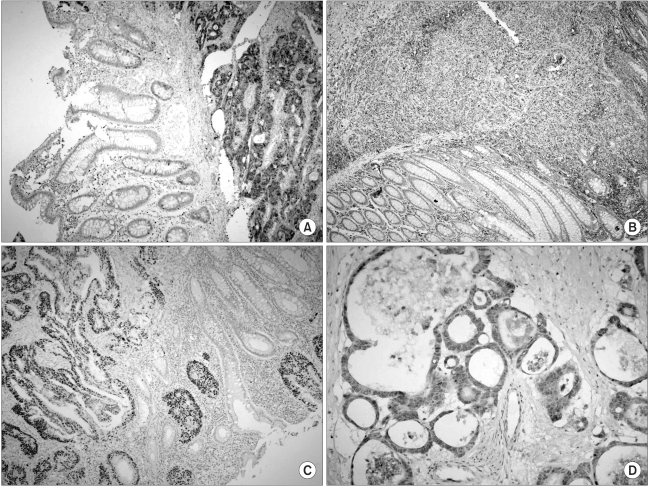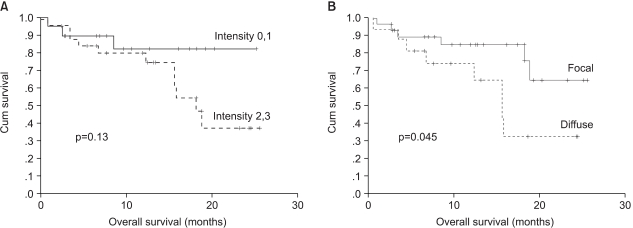Cancer Res Treat.
2005 Aug;37(4):216-222.
Thymidylate Synthase, Thymidine Phosphorylase, VEGF and p53 Protein Expression in Primary Colorectal Cancer for Predicting Response to 5-fluorouracil-based Chemotherapy
- Affiliations
-
- 1Department of Internal Medicine, College of Medicine, Hanyang University, Seoul, Korea. ahnmj@hanyang.ac.kr
- 2Department of General Surgery, College of Medicine, Hanyang University, Seoul, Korea.
- 3Department of Pathology, College of Medicine, Hanyang University, Seoul, Korea.
Abstract
- PURPOSE
In the treatment of advanced metastatic colorectal cancer, several new agents, such as irinotecan and oxaliplatin, have been developed, which have improved both disease free and overall survivals. Among these agents, 5-fluorouracil (5-FU) still remains one of the most active agents, and the selection of patients who can benefit from 5-FU-based chemotherapy is still important, as those unlikely to benefit could be spared the harmful side effects. The expression levels of thymidylate synthase (TS), thymidine phosphorylase (TP) and p53 have been known to be associated with the clinical response to 5-FU-based therapy as well as the prognosis, and that of vascular endothelial growth factor (VEGF) is associated with poor survival. MATERIALS AND METHODS: The relationship between the expressions of TS, TP, VEGF and p53 in primary tumors, using immunohistochemistry, and the response of 45 metastatic colorectal cancer patients (M: F=25: 20, median age 59 yrs) to 5-FU-based chemotherapy were evaluated. RESULTS: Thirty-seven patients were treated with 5-FU/ LV/irinotecan (FOLFIRI) and 8 with 5-FU/LV/oxaplatin (FOLFOX). The overall response rate was 28.9% (13/45). When immunohistochemically analyzed with monoclonal antibodies against TS, TP, VEGF and p53, 55.6% of the patients (25/45) were positive for TS, 48.9% (22/45) for TP, 82.2% (37/45) for VEGF, and 80% (36/45) for p53. There was a significant difference in the intensity of TS expression between the clinical responders and non-responders (p=0.036). In terms of the staining pattern of TS expression, diffuse staining was correlated with a poor response (p=0.012) and poor survival (p=0.045). However, there was no correlation between the expressions of TP, VEGF or P53 and the response to chemotherapy. CONCLUSION: These results suggest that the expression of TS in primary colorectal cancer might be an important prognostic factor for chemotherapy response and survival, and might be a useful therapeutic marker for the response of chemotherapy.
Keyword
MeSH Terms
-
Antibodies, Monoclonal
Colorectal Neoplasms*
Drug Therapy*
Fluorouracil
Humans
Immunohistochemistry
Prognosis
Thymidine Phosphorylase*
Thymidine*
Thymidylate Synthase*
Vascular Endothelial Growth Factor A*
Antibodies, Monoclonal
Fluorouracil
Thymidine
Thymidine Phosphorylase
Thymidylate Synthase
Vascular Endothelial Growth Factor A
Figure
Reference
-
1. Johnston PG, Allegra CJ. Colorectal cancer biology: clinical implications. Semin Oncol. 1995; 22:418–432. PMID: 7570055.2. Shin HR, Jung KW, Won YJ, Park JG. KCCR-Affiliated Hospitals. 2002 Annual Report of the Korea Central Cancer Registry; Based on registered data from 139 hospitals. Cancer Res Treat. 2004; 36:103–114.
Article3. Grem JL. Chabner BA, Collins JM, editors. Fluorinated pyrimidines. Cancer chemotherapy, principles and practice. 1990. Philadelphia, PA: Lippincott;p. 180–224.4. Moertel CG. Chemotherapy for colorectal cancer. N Engl J Med. 1994; 330:1136–1142. PMID: 8133857.
Article5. Sotos GA, Grogan L, Allegra CJ. Preclinical and clinical aspects of biomodulation of 5-fluorouracil. Cancer Treat Rev. 1994; 20:11–49. PMID: 7507404.
Article6. Danenberg PV. Thymidylate synthase: a target enzyme in cancer chemotherapy. Biochem Biophys Acta. 1977; 473:73–92. PMID: 145246.7. Johnston PG, Drake JC, Trepel J, Allegra CJ. The immunological quantitation of thymidylate synthase using the monoclonal antibody TS 106 in 5-FU sensitive and resistant human cancer cell lines. Cancer Res. 1992; 52:4306–4312. PMID: 1643628.8. Jackman AL, Kelland LR, Kimbell R, Brown M, Gibson W, Aherne GW, et al. Mechanisms of acquired resistance to the quinazoline thymidylate synthase inhibitor ZD1694 (Tomudex) in one mouse and three human cell lines. Br J Cancer. 1995; 71:914–924. PMID: 7537518.
Article9. Johnston PG, Fisher ER, Rockette HE, Fisher B, Wolmark N, Drake JC, et al. The role of thymidylate synthase expression in prognosis and outcome of adjuvant chemotherapy in patients with rectal cancer. J Clin Oncol. 1994; 12:2640–2647. PMID: 7989939.
Article10. Popat S, Matakidou A, Houlston RS. Thymidylate synthase expression and prognosis in colorectal cancer: a systematic review and meta-analysis. J Clin Oncol. 2004; 2:529–536. PMID: 14752076.
Article11. Leichman CG, Lenz HJ, Leichman L, Danenberg K, Baranda J, Groshen S, et al. Quantitation of intratumoral thymidylate synthase expression predicts for disseminated colorectal cancer response and resistance to protracted-infused fluorouracil and weekly leucovorin. J Clin Oncol. 1997; 15:3223–3229. PMID: 9336359.12. Johnston PG, Lenz HJ, Leichman CG, Danenberg KD, Allegra CJ, Danenberg PV, et al. Thymidylate synthase gene and protein expression predicts for correlate and are associated with response to 5-fluorouracil in human colorectal and gastric tumors. Cancer Res. 1995; 55:1407–1412. PMID: 7882343.13. Maeda K, Chung YS, Ogawa Y, Takatsuka S, Kang SM, Ogawa M, et al. Thymidine phosphorylase/platelet derived endothelial cell growth factor expression associated with hepatic metastasis in gastric carcinoma. Br J Cancer. 1996; 73:884–888. PMID: 8611421.14. Ferrara N, Hezel WJ. Pituitary follicular cells secrete a novel heparin-binding growth factor specific for vascular endothelial cells. Biochem Biophys Res Commun. 1989; 161:851–858. PMID: 2735925.
Article15. Ferrara N, Houck K, Jakeman L, Leung DW. Molecular and biological properties of the vascular endothelial growth factor family of proteins. Endocr Rev. 1992; 13:18–32. PMID: 1372863.
Article16. Toi M, Inada K, Suzuki H, Tominaga T. Tumor angiogenesis in breast cancer; its importance as prognostic indicator and the association with vascular endothelial growth factor expression. Breast Cancer Res Treat. 1995; 36:193–204. PMID: 8534867.17. Bunz F, Hwang PM, Torrance C, Waldman T, Zhang Y, Dillehay L, et al. Disruption of p53 in human cancer cells altersthe responses to therapeutic agents. J Clin Invest. 1999; 104:263–269. PMID: 10430607.18. Johnston PG, Benson AB, Catalano P, Rao M, O'Dwyer PJ, Allegra CJ. Thymidylate synthase protein expression in primary colorectal cancer: lack of correlation with outcome and response to fluorouracil in metastatic disease sites. J Clin Oncol. 2003; 21:815–819. PMID: 12610179.
Article19. Saito H, Tsujitani S, Oka S, Kondo A, Ikeguchi M, Maeta M, et al. The expression of thymidine phosphorylase correlates with angiogenesis and the efficacy of chemotherapy using fluorouracil derivatives in advanced gastric carcinoma. Br J Cancer. 1999; 81:484–489. PMID: 10507774.
Article20. Paradiso A, Simone G, Petroni S, Leone B, Vallejo C, Lacava J, et al. Thymidylate synthase and p53 primary tumor expression as predictive factors for advanced colorectal cancer patients. Br J Cancer. 2000; 82:560–567. PMID: 10682666.21. Aschele C, Debernardis D, Tunesi G, Maley F, Sobrero A. Thymidylate synthase protein expression in primary colorectal cancer compared with the corresponding distant metastases and relationship with the clinical response to 5-fluororuacil. Clin Cancer Res. 2000; 6:4797–4802. PMID: 11156237.22. Gorlick R, Metzger R, Danenberg KD, Salonga D, Miles JS, Longo GS, et al. Higher levels of thymidylate synthase gene expression are observed in pulmonary as compared to hepatic metastases of colorectal adenocarcinoma. J Clin Oncol. 1998; 16:1465–1469. PMID: 9552053.23. Cascinu S, Aschele C, Barni S, Debernardis D, Baldo C, Tunesi G, et al. Thymidylate synthase protein expression in advanced colon cancer; Correlation with site of metastasis and clinical response to leucovorin modulated bolus 5-fluorouracil. Clin Cancer Res. 1999; 5:1996–1999. PMID: 10473077.24. Ferrara N, Gerber HP, LeCouter J. The biology of VEGF and its receptors. Nat Med. 2003; 9:669–676. PMID: 12778165.
Article25. Kieser A, Weich HA, Brandner G, Marme D, Kolch W. Mutant p53 potentiates protein kinase C induction of vascular endothelial growth factor expression. Oncogene. 1994; 9:963–969. PMID: 8108142.
- Full Text Links
- Actions
-
Cited
- CITED
-
- Close
- Share
- Similar articles
-
- A High Thymidylate Synthase Expression is Related to Better Outcome for Advanced Gastric Cancer Patients Treated with 5-FU Chemotherapy after Curative Resection
- Significance of Thymidylate Synthase Expression in Colorectal Cancer
- The Relation between Microsatellite Instability and the Thymidylate Synthase Expression in Gastric Cancer
- Effects of Lovastatin in Combination with 5-FU on Stomach Cancer Cells
- Thymidylate Synthase Expression Using Immunohistochemical Staining in Colorectal Cancer



